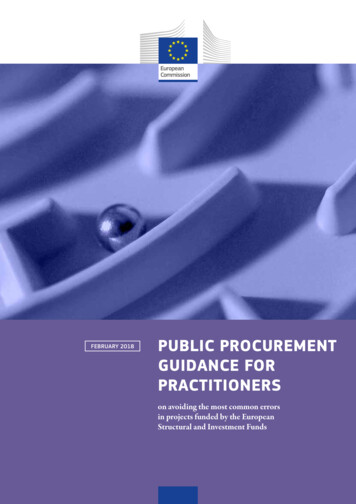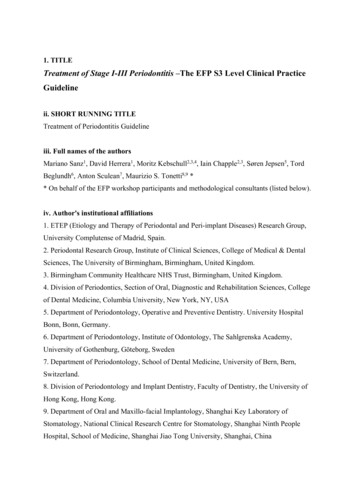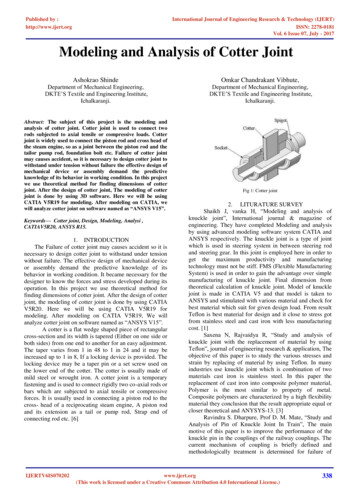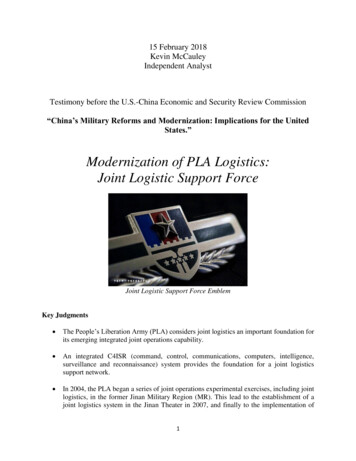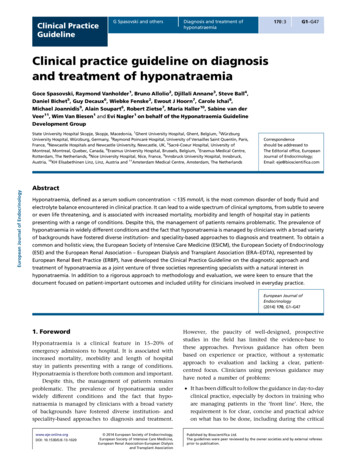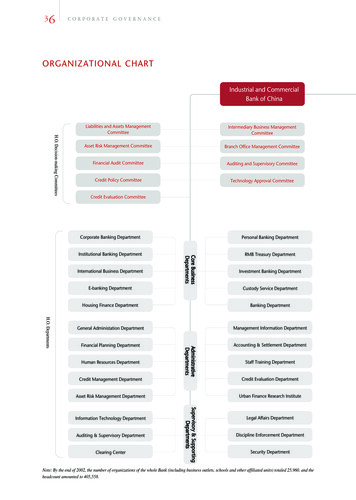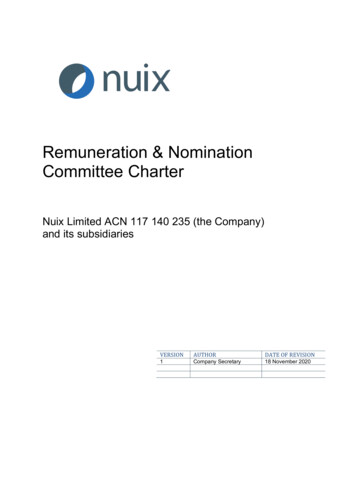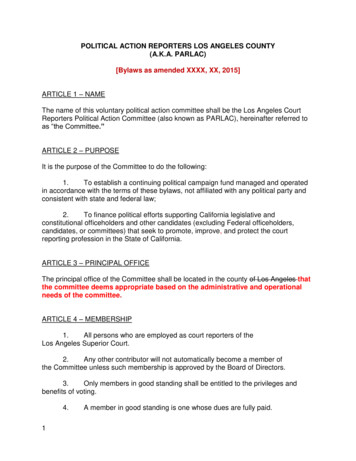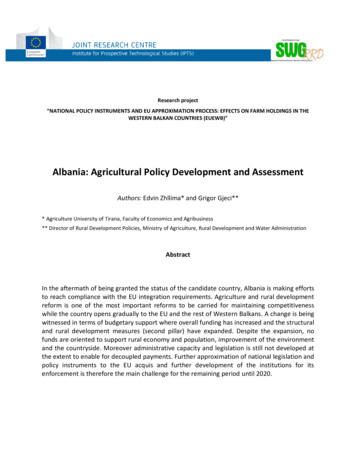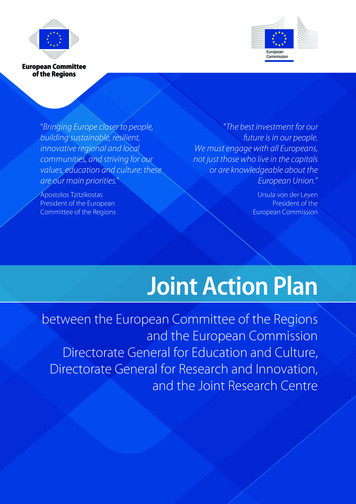
Transcription
“Bringing Europe closer to people,building sustainable, resilient,innovative regional and localcommunities, and striving for ourvalues, education and culture: theseare our main priorities.”Apostolos TzitzikostasPresident of the EuropeanCommittee of the Regions“The best investment for ourfuture is in our people.We must engage with all Europeans,not just those who live in the capitalsor are knowledgeable about theEuropean Union.”Ursula von der LeyenPresident of theEuropean CommissionJoint Action Planbetween the European Committee of the Regionsand the European CommissionDirectorate General for Education and Culture,Directorate General for Research and Innovation,and the Joint Research Centre
Joint Action PlanMariya GabrielAnne KarjalainenEuropean Commissionerfor Innovation, Research,Culture, Education and YouthChair of the Commissionfor Social Policy, Education,Employment, Research and Culture“Regions and cities play an essential role inachieving our green and digital transitions .The Joint Action Plan and the relaunchedKnowledge Exchange Platform work plan thatthe Committee of the Regions and theEuropean Commission are adopting aremilestones in our renewed EuropeanResearch Area and focus on concretesolutions to improve citizens’ lives.”“Firmly anchoring at local and regional levelactions in the field of education, research &innovation and culture are key to Europe'scohesion, sustainable recovery and smoothtransition to a carbon-neutral economy. TheJoint Action Plan fully reflects the political willto take forward joined actions on the ground,fostering strong synergies between policiesand instruments, so that no person and noplace is left behind.”IntroductionInnovation, research, culture and education will be key to our competitiveness and our abilityto lead in the transition to a climate-neutral economy and a new digital age. This joint actionplan will cover four priority areas of collaboration between the Committee of the Regions(CoR), the Directorate-General responsible for the EU Commission's policies on education,culture, multilingualism, youth and sport, the Directorate-General for Research andInnovation and the Joint Research Centre. With 26 concrete actions, we aim to increase theadministrative and implementation capacity of the Regions to not leave anyone behind,reducing the innovation divide and to build a well interconnected innovation ecosystem inEurope. The common denominator among all these actions is that they touch on citizens intheir daily life. We need to make sure that many more young Europeans are aware and ableto benefit from the support and opportunities we designed for them through our strengthenedprogrammes, empowering young people to embody a Europe of talent.This document is based on the existing protocol on inter-institutional agreement betweenthe European Commission and the Committee of the Regions (2012/C 102/02).
Priority A. No one left behind, evidence-based policymaking in theRegionsThe objective is to ensure that regions have access to state-of-the-art knowledge andresources for policymaking. These resources are available at national level but notnecessarily at regional level. We will increase administrative and institutional capacity, whichis particularly relevant for regions that would otherwise be left behind. The KnowledgeExchange Platform Work Plan (KEP 2.0) run by DG R&I with the Committee of theRegions since 2015, will be the perfect platform to achieve this, with its renewed focus onthe European Research Area priorities and more strategic approach, to enable and fostercoordination with the R&I initiatives of the Joint Action Plan and those promoted by the otherpartner DGs. It will give support to the dissemination and engagement of CoR stakeholderson the R&I-related actions of the Joint action plan. With KEP 2.0, the CoR will get informedabout the latest R&I policy developments and will bring-in the regional perspective andexperience for a strategic exchange.Science meets Regions – beyond the pilot phase is a flagship initiative that the JRC hasimplemented in close consultation with the CoR to support science-based policymaking atregional and local level, as well as cooperation and exchange of best practices amongregions. The Science meets Regions project, which has been rolled out successfully in theEU, has also attracted attention in the context of support for the Western Balkans. Therefore,we propose to extend Science meets Regions to the Western Balkans, bringing togetherlocal and international experts together with policymakers on specific topics, in particular,training and awareness-raising initiatives on the importance of solid evidence uptake inpolicymaking processes.Up to now, the resilience dashboards have been developed by the JRC at national level andcurrently there is no ongoing activity related to developing a similar approach to resilienceat regional level.Regarding resilience, JRC will liaise with the CoR in order to better understand the preciseneeds and offer support, especially with a view to accomplishing the Green Deal locally(based on available JRC expertise and resources). This cooperation will also include, as anew project, a Mapping of educational inequalities, in the light of the pandemic and thechallenges of access to e-learning.The JRC Smart Specialisation Platform is committed to providing renewed andstrengthened support for local and regional administrations in the design andimplementation of innovation strategies for place-based economic transformation and toproviding better intelligence, advice and knowledge to policymakers around the EU. TheCoR can provide the ideal forum to discuss the gaps in administrative and institutionalcapacity at the regional and local level that may hamper fully reaping the advantages of thestrategic approach to innovation policy, and ways to overcome them. Collaboration on crossborder cooperation between regions could also be strengthened. The JRC can provide awealth of data at national and subnational level. It is willing to assist the CoR in order tofacilitate the use of those data and information, including in relation to the COVID-19pandemic and allow access to sub-national level data related to innovation and researchpolicies and Smart Specialisation, the digital transformation or Territorial ImpactAssessments.2
Table of ActionsAction1. Knowledge Exchange Platform Work Plan (KEP 2.0) DG R&I will run the KEP 2.0 in collaboration with the CoR. Each set ofevents/actions will contribute to EXPLAIN, ENGAGE and EMPOWERregional/local policymakers and actors through: bringing the main ERAconcepts and messages closer to citizens and multiplying its reach;giving the opportunity to regional and local actors to promote their R&Iactivities and competences in a specific ERA area; supporting aninformed decision-making process at regional/local level on theopportunities offered at European level. CoR members will host the events and act as ambassadors. Coordination with the JRC programme "Science meet Regions" will beensured.2. Science meets Regions – beyond the pilot phase The JRC (and notably the territorial development units) will continue toprovide scientific support to regional initiatives. The interregionalcollaboration dimension will be enhanced. Synergies between "Science meets Regions" and the RTD-CoR initiative"Knowledge Exchange Platform" (KEP) in the context of ERA will bestrengthened.3. Extending Science meets Regions to the Western Balkans After a successful pilot, the JRC will extend the Science meetsParliaments / Science meets Regions approach throughout the WesternBalkans.4. Studies in Resilience, Mapping educational inequalities A Mapping of educational inequalities in the light of the pandemic andthe challenges of access to e-learning, carried out jointly with the JRC.Exploring the extension of the national resilience dashboards developedby the JRC to the regional level.5. Support for Smart Specialisation & Territorial Development Online workshop on S3 implementation (early 2021) Organise an event in Seville to showcase the JRC-CoR collaboration inSmart Specialisation and discuss the way forward with the mainstakeholders, in the EU and at the global scale (for example UN-Habitatand the UN Inter-agency Task Team on Science, Technology andInnovation for the SDGs or the UN Convention on the Rights of Personswith Disabilities). Examine the governance implications of the inclusion of local authoritiesin the design and implementation of sustainable development agendasand the Green Deal, as well as the prominent role that innovation-ledagendas based on the Smart Specialisation governance approach couldplay.3
Examine the gaps in administrative and institutional capacity at theregional and local level, and ways to overcome them. The CoR can become a forum for discussing the possibilities for buildingadministrative and institutional capacity at the regional and local level, aswell as synergies between smart specialisation strategies with otherregional innovation plans or strategies .6. Provision of sub-national data relevant to regions and citiesThe JRC can provide data at national and sub-national level: The Knowledge Centre for Territorial Policies, soon to undergo a majorupdate, provides sub-national level data via the Urban Data PlatformPlus, including in relation to the COVID-19 pandemics; The new Annual Regional Database of the European Commission(ARDECO) might be of relevance in the context of Territorial ImpactAssessments; The Smart Specialisation Platform hosts several applications that allowaccess to sub-national level data related to innovation and researchpolicies and Smart Specialisation, as well as digital transformation(Eye@RIS3 tool mapping and comparing the Smart Specialisation policypriorities; R&I Regional Viewer provides a structured, regionalisedvisualisation of regional funding flows; Digital Innovation Hubs toolprovides a geo-localised map of Digital Innovation Hubs and theircharacteristics); Cooperation to the LORDI initiative; regional input-output systems (andpotential applications to value chains, economic interdependency etc.)and the territorial impact assessment of policies. Interactive pilot tool (dashboard) bringing together R&I data from ERDF(Interreg), with data from the Horizon2020: policy areas; funded projectsand participations. The target audience will be policy-makers (e.g. forprogramming purposes) and potential applicants (e.g. who may want toexpand their options in their quest for partners).Priority B. Close consultation on the implementation of the EuropeanResearch Area (ERA), the European Education Area (EEA) and the DigitalEducation Action Plan (DEAP), Horizon Europe Missions and otherinitiativesThe objective is to include the regional dimension in the implementation of all policyinitiatives in the area of Innovation, research, education, culture and sport, to build bridgesbetween the initiatives and the CoR.The CoR will be involved in, and at the same time benefit from, the mapping of knowledgeecosystems across the EU, with a view to developing the ERA Hubs initiative. The ERAHubs will be structures bringing together ecosystem actors and networking those structuresthat share standards of work and quality. In addition, the CoR will be an important partner inthe dissemination of the European Innovation Council (EIC) European Innovationecosystems local and regional-related activities, developing synergies with their actors,policies and programmes, and could possibly play a role in the EIC forum. A role for theCommittee of the Regions in the ERA governance, based on the principle of inclusivenessand multilevel-governance approach, could be envisaged.4
In the wider context of promoting synergies with Cohesion policy funds, the promotion of theSeal of Excellence initiative at the regional level could be carried out through the relevantCoR Members and by taking part in the SoE "Community of Practice".The Committee of the Regions will be involved in consultations related to the implementationof the European Education Area, in which local and regional authorities will have animportant role in delivery. For 2020-2021, this would include the initiatives on "Pathways toSchool Success", "Education for environmental sustainability", "The transformation agendaof higher education and universities", the "European Student Card initiative" and "mobilityfor volunteering and solidarity purposes". They can also help in promoting dedicatedplatforms for exchanges, such as eTwinning, the School Education Gateway, the ElectronicPlatform for Adult Learning in Europe (EPALE), the European Youth Portal (including theEuropean Solidarity Corps portal) and OpenU. To encourage teachers, trainers, youngpeople, schools, universities and local organisations to take part in online courses, accessonline material, learn from other professionals in a wide range of fields, share their ownpractices and access information on opportunities through EU programmes.The European Commission will create a new European Education Area Portal thatprovides systematic information on the various enabling framework activities, disseminatesoutputs, and facilitates the implementation of what has been agreed. The idea is to placegreater emphasis on EEA visibility, dissemination of results and specific thematic supportfor Member States. The portal will also give visibility to the main initiatives at regional andlocal level.European Universities are closely linked to their regions and cities. We need to stimulatein particular the creation of European knowledge by co-creating teams of academics andstudents, together with regional actors, researchers, businesses, and civil society to jointlyaddress societal challenges in a multi-disciplinary approach. This must be done in synergywith regional and local communities and will pave the way for interesting job opportunitiesfor students in their home countries. In addition, European Universities will be centres ofgravity for upskilling and reskilling adult learners, including active professionals, with highlevel and forward-looking competences in a twin transition: digital and climate. Importantly,this will support job creation/preservation at local and regional level, helping businesses thathave an insufficiently skilled workforce.The CoR can become closely involved in the "Education for Climate" Coalition. Thecoalition will be launched by the end of 2020 to support the implementation of the EuropeanClimate Pact. The Coalition will involve regions and local communities, to work on:curriculum development, teacher training, pedagogical tools and sustainable schoolinfrastructure, supported by the Erasmus programme to mobilise expertise, provideresources for networking and support creative approaches with teachers, pupils andstudents. In synergy with the European Climate Pact, the policy guidance underdevelopment, which promotes education for environmental sustainability, and theopportunities offered by the Erasmus , will provide a link between bottom-up initiatives andEU-level action, supporting pledges and concrete actions for sustainable behaviour acrossthe EU.Equally important is the cooperation in the context of the updated Digital Education ActionPlan (DEAP), and its Connectivity4Schools initiative supporting high-speed connectivityfor schools and VET providers located in rural areas. The cooperation will also cover thenew European Digital Education Hubs, linking national and regional digital educationinitiatives and strategies and connecting national authorities, experts, education and training5
providers, civil society, entrepreneurs and other stakeholders at regional, national and EUlevel. The new DEAP will support the EU Science, Technology, Engineering andMathematics (STEM) Coalition to develop new higher education curricula for engineeringand Information and communications technology (ICT) based on the science, technology,engineering, arts and mathematics (STEAM) approach, as well as to boost the participationand careers of women in STEM.The RTD and EAC, together with the CoR, will work to establish links between the EEA andERA, in particular as regards (i) empowering the higher education sector through acomprehensive transformation agenda to be developed together with stakeholders, MemberStates, and regions, and (ii) strengthening synergies between Erasmus and HorizonEurope in support of these transformations for the future of universities in Europe.ERA4You is a policy initiative aimed at (i) developing intersectoral mobility for a better flowthrough of talent to society; and (ii) tackling brain-drain by supporting low-performingcountries in R&I to promote excellence in their R&I systems. Both dimensions are subject toreforms of national R&I systems, requiring favourable framework conditions such asexcellent research infrastructure, attractive working conditions and adequate remunerationpackages. The ERA4You aims to support and incentivise such transformations, to achievea more balanced circulation of talent, across both regions and sectors. It proposes anapproach that strengthens synergies between EU and national and regional programmes. Itwill also foster structured collaboration between academia and businesses, and acrossdisciplines and borders, within the internal market.The Horizon Europe Missions aim to deliver solutions to some of the greatest challengesfacing our world. Cities and regions are the natural environment for the deployment of thesesolutions. The Committee of the Regions will play a strategic role by connecting both worlds:the RTD Mission-oriented thinking and the implementation side, where challenges aretackled. Its role could be to facilitate stakeholders and education programmes/campaigns toraise awareness among the public in all five mission areas (Climate Neutral and SmartCities; Adaptation to Climate Change including Societal Transformation; Cancer; HealthyOceans Seas, Coastal and Inland Waters; Soil Health and Food).The collaboration of the Committee of the Regions with the European Capitals of Cultureinitiative should carry on, through participation in the selection of the Capitals through therelated expert group and the monitoring activities.Moreover, in the short and medium term, there will be a number of different events in whichthe CoR can contribute or participate. These include events under the Work Plan for Culture2019-2022 and other events. Within the CoR, the Commission for Social Policy, Education,Employment, Research and Culture (SEDEC) could further emphasise the role of culture incities and regions at the European Week of Regions and Cities. Indeed, every year, anumber of sessions are devoted to the topics of culture/cultural heritage.The CoR is and will remain an observer in the Commission's Expert group on culturalheritage, which acts as a platform for consultation and exchanging best practice forsustainable and participatory cultural heritage policies in Europe. The Commissionrepresentatives remain available to take part in SEDEC meetings.The CoR also designates one member of the European panel of independent experts thatwas established to carry out the selection and monitoring at Union level of EuropeanHeritage Label sites.6
Sport makes a direct contribution to economic activity and social cohesion in any givenregion by encouraging innovation, fostering sustainable development and urbanregeneration and enhancing the overall attractiveness of regions. The CoR Opinion"Mainstreaming sport into the EU agenda post-2020", demonstrates its interest in sportspolicy. Also, the annual European Week of Cities and Regions traditionally includes sportsrelated sessions. The Sport Chapter in the Erasmus supports European partnerships ongrassroots sport (and as such, is anchored at local level). Different flagship initiatives andthe launch of the Erasmus call for close collaboration with local actors will reinforcecooperation with the CoR.Table of ActionsActions7. Involvement in ERA design & implementation - Synergies with localactors: ERA Hubs, EIC innovation ecosystems, EIC Forum, Seal ofExcellence and policy dialogue The CoR will be involved in, and at the same time benefit from, themapping of knowledge ecosystems across the EU run by DG R&I with aview to designing the ERA Hubs. The CoR will be an important partner in the dissemination of the EICEuropean Innovation ecosystems' local and regional-related activitiesand in boosting synergies with their actors, policies and programmes,and could play a role in the EIC forum, should a working group be setup on the regional aspects of innovation ecosystems. Involvement of the CoR in the Seal of Excellence initiative could bethrough its promotion by CoR Members at regional level, and by takingpart in the SoE "Community of Practice" established by the Commission,for exchanges of know-how and good practices. DG R&I will focus in particular on establishing a policy dialogue withregions as part of the R&I/ERA related policy dialogue with MemberStates, based on a screening of the R&I needs of and practicalchallenges faced by regional authorities and local players. Involvementof CoR in the ERA governance could be envisaged.8. Involve the Committee of the Regions in consultations related to theimplementation of the European Education Area Local and regional authorities have an important role in theimplementation of the EEA, including in the initiatives on "Pathways toSchool Success", "Education for Environmental Sustainability", the"Higher Education Transformation Agenda" the "European StudentCard initiative" and "Mobility for Volunteering and SolidarityPurposes".The CoR could help promote dedicated platforms for exchanges, suchas eTwinning, the School Education Gateway, EPALE, the EuropeanYouth Portal (including the European Solidarity Corps portal) andOpenU, to encourage teachers, trainers, young people, schools,universities and local organisations to take part in online courses, accessonline material, exchange good practice, and access information onopportunities through EU programmes.7
9. European Education Area (EEA) Portal and European Research Area(ERA) Portal The new EEA Portal and the ERA Portal will provide information onenabling framework activities, disseminate outputs and facilitateimplementation. The portals will be a permanent and constantly updatedinformation tool.The EEA and the ERA portals will also give visibility to the main initiativesat regional and local level.10. Cooperation on European Universities initiative and regions Will stimulate the creation of European knowledge and co-creatingteams of academics and students, together with regional actors,researchers, businesses, and civil society, to jointly address societalchallenges in a multi-disciplinary approach. This must be done in synergy with regional and local communities andwill pave the way for interesting job opportunities for students in theirhome countries. European Universities will be centres of gravity for upskilling andreskilling adult learners, including active professionals, with high-leveland forward-looking competences in a twin transition: digital and climate.11. Education for Climate -Coalition The coalition will support implementation of the European Climate Pact.The Coalition will involve regions, local communities, to work on:curriculum development, teacher training, pedagogical tools andsustainable school infrastructure. Supported by the Erasmus programme to mobilise expertise, provideresources for networking and support creative approaches with teachers,pupils and students. In synergy with the European Climate Pact, it will bea link between local bottom-up initiatives and EU-level action, supportingpledges and concrete actions to change sustainability behaviour acrossthe EU.12. Cooperation in the context of the updated Digital Education ActionPlan: Connectivity4Schools initiative, to support high-speed connectivity forschools and VET providers located in rural areas. Cooperation through the new European Digital Education Hubs to linknational and regional digital education initiatives and strategies andconnect national authorities, experts, education and training providers,civil society, entrepreneurs and other stakeholders at regional, nationaland EU level. The new DEAP will support the EU STEM Coalition to develop newhigher education curricula for engineering and ICT based on the STEAMapproach to increase the participation and careers of women in STEM,and to provide mentoring schemes and guidance for female students bypromoting role models in STEM fields.8
13. Strengthen links between the European Education Area and theEuropean Research Area Strengthen synergies between Erasmus and Horizon Europe,Engage with the full roll-out of the European Universities initiative underthe Erasmus programme, in close synergy with Horizon Europe andother EU instruments.Ensure full synergies between the universities’ four missions - education,research, innovation and service to society. – The new ERA and EEAtogether will help enable shared objectives between the EU, MemberStates and regional initiatives to empower higher education institutionsin their transformation efforts on the missions for education, research,innovation and service to society. The CoR will be involved in theconsultation process for the transformation agenda, and the subsequentawareness-raising at regional level.The monitoring of the European Universities initiative, piloted byErasmus , with complementary support from Horizon to fine-tune andoptimise synergies between the future programmes in support of HigherEducation sector.14. ERA4You initiative and contribution to inter-sectoral mobility Through ERA4You, the DG R&I aims to support and incentivisetransformations to achieve a more balanced circulation of talent, acrossboth regions and sectors. It will include targeted mobility measures andawareness-creation at national and regional level about existing and newinitiatives to support researchers in lower performing Member States todevelop R&I excellence. As part of the approach, a study will aim at mapping the brain-drainproblem in the ERA, analysing its causes and identifying the mostappropriate solutions to enable evidence-based and sustainable policiesfor improving cross-border circulation of talent. The CoR can participatein the analysis regarding the search for solutions The CoR will beinvolved in awareness-raising and be informed early on about all furtherdevelopment of the ERA4You initiative.15. Strong Collaboration with Horizon Europe's five Missions The CoR will have a prominent role in supporting the co-creation processfor the implementation of the missions, in coordination with DG R&I. Itwill contribute to the creation of networks of regions and participate indissemination and communication activities aimed at promotingstakeholder and citizen engagement. In particular, CoR could: cover the activities of the Global Knowledge Centre ("Climate Neutraland Smart Cities" mission), establish key partnerships in and between regions and communities("Adaptation to Climate Change including Societal Transformation"mission), supporting the objective of identifying and helping 200European communities and regions to co-create a vision and innovationpathways have a role in supporting the implementation of effective cancerprevention and screening strategies, and in dissemination and9
communication activities to transform the cancer culture (the "Cancer"mission)engage and support the co-creation process for the implementation ofthe Oceans mission, specially the place-based demonstrators, andawareness-raising among citizens (the "Healthy Oceans, Seas, Coastaland Inland Waters" mission)support, in close cooperation with DG AGRI mission secretariat, i)events, communication and outreach, ii) Stakeholder and citizenengagement, iii) Networking activities, e.g. bringing together regionalactors from living labs and lighthouses planned under the mission, iv)support for public science in the regions (the "Soil health and Food"mission) 16. European Capitals of Culture The collaboration of the CoR with the European Capitals of Cultureinitiative should carry on. The CoR continues to participate in theselection of the Capitals through the related expert group, and is alsoinvolved in the monitoring process. Cooperation on the networking and synergy-developing activities withthe Innovation Capitals and Green Capitals17. Increased synergies and participation in events Cooperation will continue on high-level conferences and events,including events under the Work Plan for Culture 2019-2022 (i.e. onalternative funding for cultural heritage; on social cohesion; on music)and other events, such as the closing conference of Cultural andCreative Spaces and Cities in 2021. The CoR Commission for Social Policy, Education, Employment,Research and Culture (SEDEC) could further emphasise the role ofculture in cities & regions at the European Week of Regions and Cities. The CoR will also be involved in the design of and will participate in theWeek of Innovative Regions in Europe (WIRE), the annual Presidencyevent supported by Horizon.18. Mutual exchange of expertise The CoR is observer in the Commission expert group on culturalheritage, set up under the European Framework for Action on CulturalHeritage (2018) to act as a platform for consultation and exchanging bestpractice for sustainable and participatory cultural heritage policies inEurope. The Commission representatives remain available to take partin SEDEC meetings. The CoR designates one member for the European panel of independentexperts, established to carry out the selection and monitoring at Unionlevel of European Heritage Label sites.19. Cooperation on sport SportHub Alliance for Regional development in Europe – the SHAREinitiative – financed through Era
Exchange Platform Work Plan (KEP 2.0) run by DG R&I with the Committee of the . The JRC Smart Specialisation Platform is committed to providing renewed and . CoR members will host the events and act as ambassadors.

